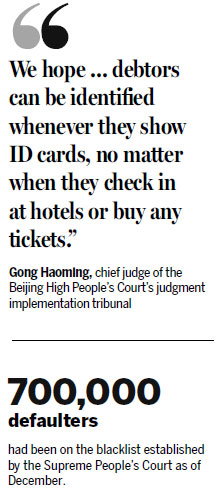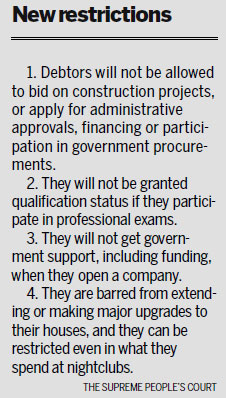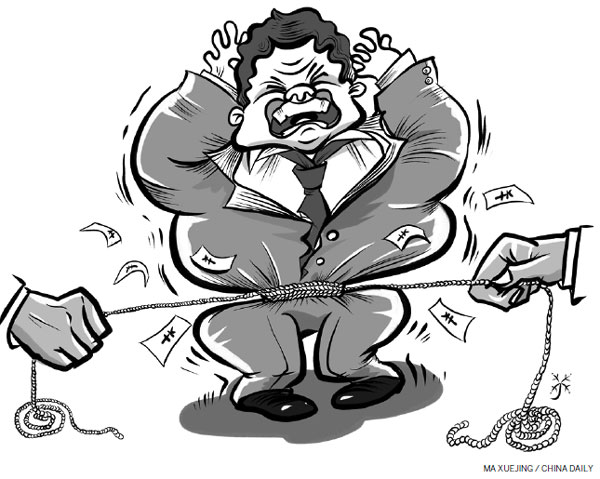Debtors pay price for ignoring court rulings
They face stiffer penalties, from seven years' jail to a ban on buying train tickets
Li Chao failed to obey a court's verdict to repay a debt, and as a result found himself imprisoned.
Li was sentenced to six months' criminal detention in March for ignoring the verdict, according to Beijing Dongcheng District People's Court.
The case dates back to 2009, when Li did not repay 680,000 yuan ($106,600) to Wang Qingchen. Wang asked Li to help him sell a house, but Li did not return the money and lost the contract, the court said. Wang later sued Li, and the court ruled against Li.
But during the following two years while the court urged Li to repay, he ignored the verdict and said he had no money.
While investigating whether the ruling was carried out, the court found that Li spent 260,000 yuan in 2012 for a BMW car, "which means he could have afforded the repayment and he allegedly intentionally neglected the verdict", said Liu Gui-xiang, director of the department of the top court that follows up on rulings.
Refusing to obey rulings is common, Liu said, adding that Li was finally sent to the grassroots court again and held responsible for the default.
Defaulters are found across the country, including debtors who think they can't be punished if they do not obey court verdicts, Liu said.
In a campaign launched by the Supreme People's Court, the Ministry of Public Security and the Supreme People's Procuratorate in November, 864 defaulters were penalized for failing to follow verdicts or disturbing public affairs.
"A court verdict represents judicial credibility, and its implementation relates to legal effectiveness," Liu said.
Liu said the top court is taking action to fulfill the goal.
Gong Haoming, chief judge of the Beijing High People's Court's judgment implementation tribunal, echoed those sentiments, saying that a fast repayment requires an effort at all levels of society.
Forbidden purchases
The top court updated a rule on July 21 on how to restrict debtors' purchases in a move to encourage defaulters to follow verdicts.
The new rule has tightened regulations governing defaulters' ability to make purchases. In the past, they were barred from buying luxury items. Now restrictions will include other items, such as train tickets, Liu said.
With high-speed train services now popular, debtors are barred from purchasing any high-speed railway ticket or a first-class seat on slower trains. In addition, there are restrictions placed on their ability to buy or build houses, rent luxury apartments for work, purchase cars, play golf and eat at hotels, and their children are not allowed to study in expensive schools.
"We hope, as their normal buying power is affected, they may repay faster," Liu said.
Gong, of the Beijing High People's Court, echoed Liu's remarks, saying Beijing developed a campaign against defaulters in October. As a result, verdicts involving a total of more than 78.4 million yuan have been implemented. But some debtors still refused to follow verdicts. Some disappeared, while others resisted the judgments with violence.
Of the cases Beijing courts handled last year, some debtors were arrested as they were ready to take flight or withdrew money from a bank, Gong said, adding that they were found because the courts shared a blacklist with the places at which they were caught.
In November 2013, the Supreme People's Court established the blacklist database and information of defaulters, including names and identity card numbers.
Now, with the restrictions extended, the blacklist has been shared with banks, businesses and government bodies such as the China Securities Regulatory Commission and the Credit Reference Center at the People's Bank of China, according to the top court.
Zhang Genda, deputy director of the top court's verdict implementation department, said the blacklist and the restrictions are two major measures to alleviate the problem that verdicts are often hard to enforce in the country.
As of December, more than 700,000 people had been on the list, and the top court releases information on two or more defaulters on its micro blog every day.
The blacklist can be extended to more industries, Zhang said, "because it's good to build the social credit system, and defaulters should be punished for their dishonesty".
In July, the top court teamed up with a consumer credit agency backed by e-commerce giant Alibaba Group, restricting those who refused to comply with judgments by preventing them from buying high-priced items online.
Sharing a blacklist
Gong approved the action, saying they are also considering sharing the blacklist with more administrative departments.
"We hope to reach the goal that debtors can be identified whenever they show ID cards, no matter when they check in at hotels or buy any tickets," Gong said.
Also in July, the top court issued a judicial interpretation on how to handle criminal cases relating to defaulters. The document says that residents can also sue if they find someone does not repay debts in line with verdicts.
In the past, default cases were submitted to courts after police and prosecutors investigated and found evidence, Zhang said, adding most clues were provided by courts.
"But now, if residents find defaulters, they can go to courts to file a suit themselves, which helps the legal system to ensure judgments are enforced in a timely manner," Zhang said.
"We not only rely on ourselves to push debtors to repay debts, but also other efforts, and it is also a good way to protect litigants' rights," he added.
According to a draft of the ninth amendment to the Criminal Law, defaulters being sued could face a jail term of up to seven years, instead of three years now.
caoyin@chinadaily.com.cn










